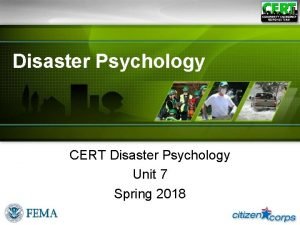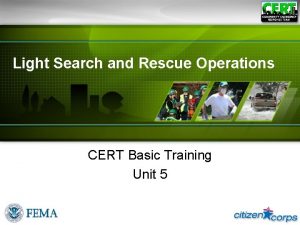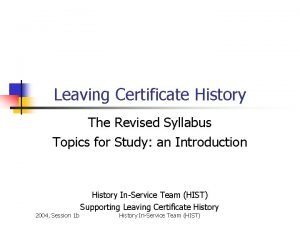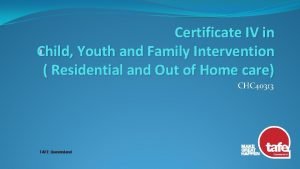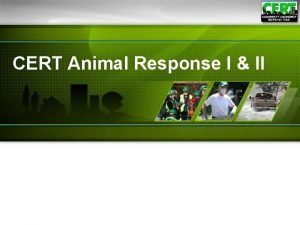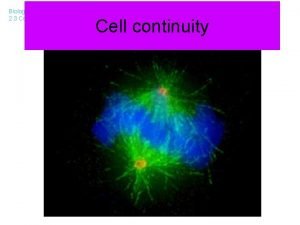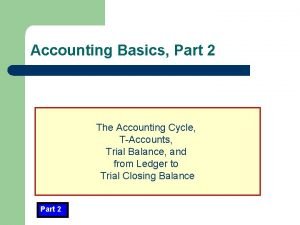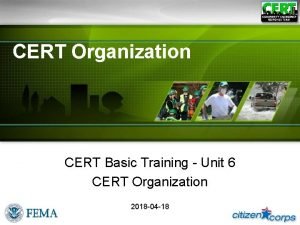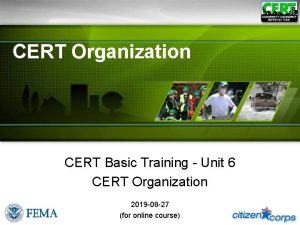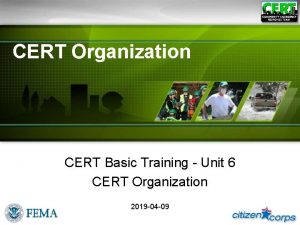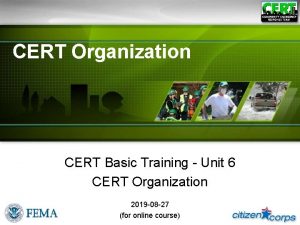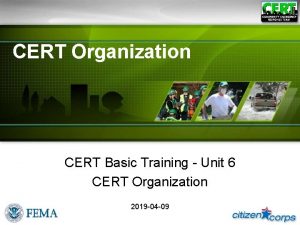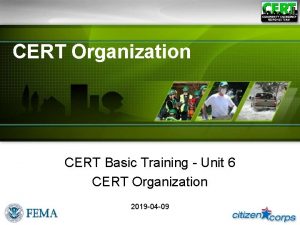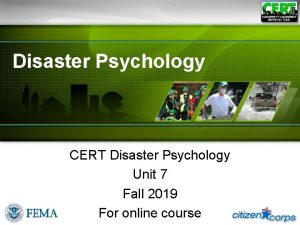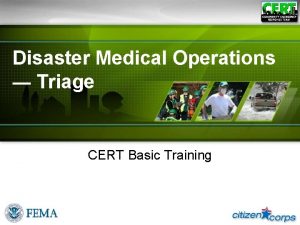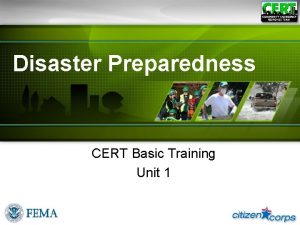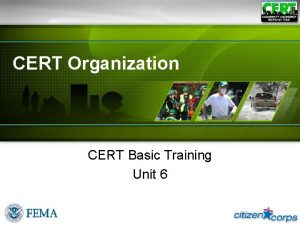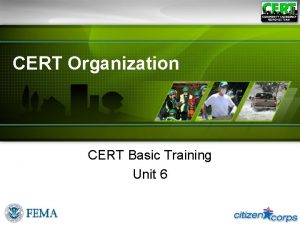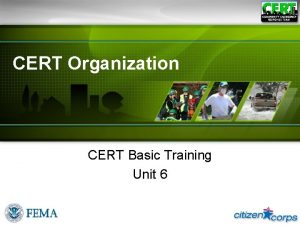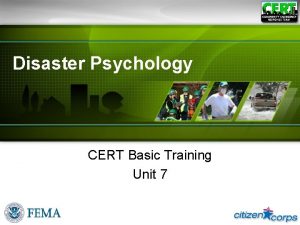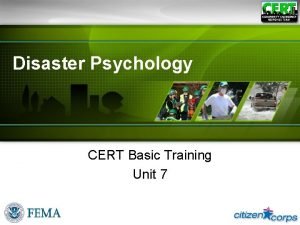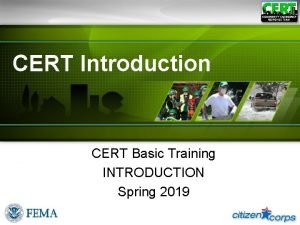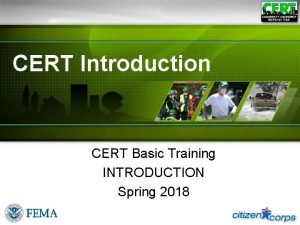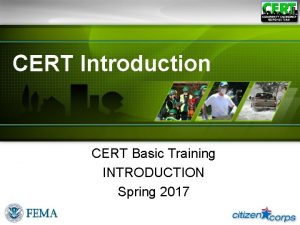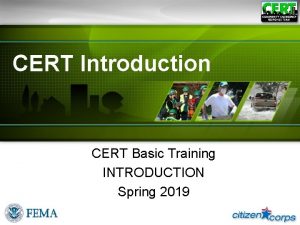Disaster Psychology CERT Disaster Psychology Unit 7 Spring





































- Slides: 37

Disaster Psychology CERT Disaster Psychology Unit 7 Spring 2018

CERT RULES ● Personal safety is ALWAYS the number one priority ● Work as a team ● Wear personal protective equipment…gloves, helmet, goggles, N 95 mask and boots CERT Goal is: Do the Greatest Good for the Greatest Number of People! Hope for the best but plan for the worst

Unit Objectives ● Describe the disaster and postdisaster emotional environment for victims and rescuers ● Describe the steps rescuers can take to relieve their own stress and that of disaster coworkers and survivors

Learn to Prepare Mentally for Disaster Response • Actions can be taken before, during, and after an incident to help manage emotional impact of disaster response work • Knowing possible psychological and physiological symptoms of disaster trauma helps manage impact • Learn to manage stress § CERT members for themselves § CERT leaders during response

Unit Topics • Disaster Trauma • Team Well-Being • Working with Survivors’ Trauma

WHAT IS DISASTER TRAUMA? ● Trauma & stress reactions in disaster ● Traumatic crisis ● Vicarious trauma ● Extreme Impact on Rescuers ● Sources of Personal Trauma ● At-Risk Groups ● Symptoms of Trauma

WHAT IS DISASTER TRAUMA? Traumatic Crisis An event in which people experience or witness: ● ● Actual or potential death Serious injury Actual or threatened sexual violence Destruction of homes, neighborhood, or valued possessions ● Loss of contact with family / close relationships

WHAT IS DISASTER TRAUMA? Traumatic stress may affect: ● Cognitive functioning--Thinking ● Physical health--Behaving ● Interpersonal reactions--Feelings

WHAT IS DISASTER TRAUMA? Vicarious Trauma The process of changes in the rescuer resulting from ü Empathic engagement with survivors ü Natural reaction to bearing witness to another’s trauma ü Identifying too strongly with survivor trauma

WHAT IS DISASTER TRAUMA? • Rescuers & Volunteers • Veterans of recent conflict & wars — OIF/OND/OEF more susceptible • People with previous psychological difficulties • Lower social support system • Post Traumatic Stress Disorder (PTSD) & Depression EXCEPT older people than younger • Lower educational achievement • Presence of chronic pain • (PTSD) or depression, increased alcohol & drug

WHAT IS DISASTER TRAUMA? Rescuers and Volunteers have potentially higher risk for psychological trauma due to w Your own personal losses w Working in your home neighborhood w Assisting neighbors, friends, co-workers who have also been injured w Not feeling safe and secure

WHAT IS DISASTER TRAUMA? Possible Psychological Symptoms: w Irritability, anger w Self-blame, blaming w w w others Isolation, withdrawal Fear of recurrence Feeling stunned, numb, or overwhelmed Feeling helpless Mood swings w Sadness, depression, w w w grief Denial Concentration, memory problems Relationship conflicts / marital discord

TEAM WELL-BEING TOPICS ● Volunteer Self-Care ● Prevention/Mitigation ● Team Leader Strategies for Team Care

TEAM WELL-BEING. . Self-Care w Be aware that disaster worker trauma/stress can follow disaster work w Explain to family member and friends how they can support you ØListen to you when you need to talk ØUnderstand that you may not want to talk w Ask for and accept help from others w Seek professional Mental Health support as needed

TEAM WELL-BEING. . Self-Care Take Care of Yourself w Be aware that disaster-worker trauma/stress can follow disaster work w Explain to family member and friends how they can support you Ø Listen to you when you need to talk Ø Understand that you may not want to talk w Ask for and accept help from others w Seek professional Mental Health support as needed

TEAM WELL-BEING Possible Physiological Symptoms w Loss of appetite w Headaches, chest pain w Diarrhea, stomach pain, nausea w Hyperactivity w Increase in alcohol or drug consumption w Chronic Insomnia: Inability to sleep, Nightmares w Fatigue, low energy

TEAM WELL-BEING Rescuer Safety and Stability First! Attend To Your CERT Team Volunteers

TEAM WELL-BEING ● First, have your house in order § Take care of your basic needs § Check on family, pets, neighbors § Put on your own Oxygen mask first § Then you can help others in distress

TEAM WELL-BEING. . Reducing Stress w Drink plenty of water w Get enough sleep w Exercise w Eat a balanced diet w Balance work, play, and rest w Accept that you cannot save everyone w Do not over-identify with survivors and do not take their feelings as your own.

TEAM WELL-BEING. . Reducing Stress w Remember that your identity is broader than just a helper w Connect with others for social support w Allow yourself to receive as well as give w Accept change - Nature and even human nature is not in your control w Talk to someone about your feelings. w Use spiritual resources

TEAM WELL-BEING CERT team leaders, and available professionals should: w w w w Provide pre-disaster stress management training Brief personnel before deployment Emphasize teamwork – identify Team roles Take breaks away – Team Leads watch for reactions Provide for proper nutrition & hydration Rotate Team members and duties Phase out disaster service workers gradually Conduct a Team debrief discussion

TEAM WELL-BEING Critical Incident Stress Debriefing phases: 1. Introductions and description 2. Review of factual material 3. Sharing of initial thoughts and feelings 4. Sharing of emotional reactions to incident 5. Instruction about normal stress reactions 6. Review of symptoms 7. Closing and further needs assessment

WORKING WITH DISASTER SURVIVORS’ TRAUMA

WORKING WITH DISASTER SURVIVORS’ TRAUMA Phases of a Crisis • Impact – survivors may show no emotion • Inventory – survivors assess damage and try to locate other survivors • Rescue – survivors willing to cooperate with rescuers • Recovery – survivors may pull together against rescuers & show hostility toward rescuers • Expect survivors to show psychological effects – some of it may be directed at you!

WORKING WITH DISASTER SURVIVORS’ TRAUMA Mediating Factors for Survivors’ Reactions w Prior experience with similar event may lead to cumulative emotion and greater stress reactions w Intensity of disruption from disaster: the more disruption, the greater the psychological and physiological reactions may become w Individual feelings about event, such as perceived meaning of event w Emotional strength of individual w Length of time since event RESCUERS MUST NOT TAKE SURVIVORS’ SURFACE ATTITUDES PERSONALLY

WORKING WITH DISASTER SURVIVORS’ TRAUMA How to Help w Listen: talking about feelings is often needed for processing them w Show that you hear their concerns: they want to know that someone else shares their feelings of pain and grief w Break isolation: connect to natural support systems such as family, friends, or clergy

WORKING WITH DISASTER SURVIVORS’ TRAUMA FIRST, Physical First Aid – Stabilize Victims w Triage survivors: RPM’s for Airway, Bleeding, Shock w Get uninjured people involved in helping THEN, Psychological Support – when time/resources are available – w Provide support by: Ø Listening Ø Empathizing, Paraphrasing w Help survivors connect with social support systems w Professional Follow-up w Mental Health Referrals

WORKING WITH DISASTER SURVIVORS’ TRAUMA How to Be an Empathetic Listener ● Put yourself in the speaker’s shoes ● Listen for meaning, not just words ● Pay attention to body language - nonverbal communication ● Reflect (paraphrase) the speaker in their own words to show that you heard him/her.

WORKING WITH DISASTER SURVIVORS’ TRAUMA How to Be an Empathetic Listener ● Allow silence – silence gives survivor time to reflect and become aware of feelings. Silence can prompt the survivor to elaborate. ● Attend nonverbally – eye contact, head nodding, caring facial expressions, and occasional “uh-huhs”. ● Paraphrase – when you repeat portions of what the survivor has said, understanding, interest, and empathy are conveyed. ● Reflect feelings – the survivor’s tone of voice or nonverbal gestures may suggest anger, sadness, or fear. Possible responses are “You sound angry, scared, etc. Does that fit for you? ” This helps survivor identify and articulate their emotions. ● Allow expressions of emotion – expressing intense emotions through tears or angry venting is an important part of healing; it often helps survivor work through feelings so they can better engage in constructive problem-solving.

WORKING WITH DISASTER SURVIVORS’ TRAUMA What You Can Say. . . ● “These are expected reactions to a disaster. ” ● “It is understandable you could feel this way. ” ● “You can’t change what happened but you can change what you do with this experience. ” ● “Things may never be the same, but you may find some things from this experience that can help you help others. ” ● Apologize if survivor reacts negatively to something that you say

WORKING WITH DISASTER SURVIVORS’ TRAUMA Avoid Saying. . . ● “I understand. ” ● “Don’t feel bad. ” ● “You are strong” or “You’ll get through this. ” ● “Don’t cry. ” ● “It’s God’s will. ” ● “It could be worse” or “At least you still have. . . ● What you really must do… (Discounts person, not understood, more alone)

WORKING WITH DISASTER SURVIVORS’ TRAUMA Managing the Death Scene w Cover the body; treat it with respect w Move the body to temporary morgue (if death occurs at Command Post) w Follow local laws and protocols w Talk with local authorities

WORKING WITH DISASTER SURVIVORS’ TRAUMA Informing Family of a Death ● Separate the family members/friends from others in a quiet, private place ● Have the person(s) sit down, if possible ● Make eye contact and use a calm, kind voice ● Use the following words to tell the family members about the death: § “I’m sorry, but your family member has died. I am so sorry. ” ● Have one family member look at the body and decide if the rest of the family should see the body ● Allow family members to hold or spend time with the deceased ● Let the family grieve privately if possible

UNIT SUMMARY • Rescues may be unpleasant or uncomfortable • Psychological and physiological symptoms of trauma • Take steps to reduce stress • CISD is one intervention • Four emotional phases of a disaster • Stress affects cognition, health, and interactions • Stabilize individuals • Be an empathetic listener

EXERCISE: DISASTER PSYCHOLOGY ● Team Up ● Review Scenarios of: § Children, Elderly, Acutely Stressed Adult ● How would you Respond in the Scenario?

DISASTER PSYCHOLOGY UNIT # 7 RESOURCES ● ● ● Unit # 7 Participant Manual Unit # 7 Video <http: //1. usa. gov/1 pra 6 d. E> Unit # 7 Video transcript <http: //1. usa. gov/1 pra 6 d. E> Unit #7 slide handout NERT Psychological First Aid handouts § Addendum § Worksheets

HOMEWORK for Class 2 ● Fill out the NERT Psychological First Aid handout. Think about how you will feel and respond to a disaster, to CERT coworkers, and to victims. ● Watch FEMA/CERT video online: § Unit # 7 Video <http: //1. usa. gov/1 pra 6 d. E> § Unit # 7 Video transcript <http: //1. usa. gov/1 pra 6 d. E>
 Cert disaster psychology
Cert disaster psychology Giduk
Giduk Months
Months Unit 6 review questions
Unit 6 review questions How to find the restoring force of a spring
How to find the restoring force of a spring Unit 9 natural disasters
Unit 9 natural disasters Olysalý čert
Olysalý čert Wb
Wb Timing for english paper 1
Timing for english paper 1 Trial balance junior cert
Trial balance junior cert Smart cert
Smart cert Singcert
Singcert Regional geography leaving cert
Regional geography leaving cert Light search and rescue operations
Light search and rescue operations Leaving cert history syllabus
Leaving cert history syllabus Construction studies experiments
Construction studies experiments Nitrogen cycle diagram leaving cert
Nitrogen cycle diagram leaving cert Formation of sedimentary rocks leaving cert
Formation of sedimentary rocks leaving cert Leaving cert physical education
Leaving cert physical education Music technology leaving cert
Music technology leaving cert Certificate iii in pathology collections
Certificate iii in pathology collections Cert.korcham
Cert.korcham Elizabeth bishop leaving cert notes
Elizabeth bishop leaving cert notes Sestina by elizabeth bishop analysis
Sestina by elizabeth bishop analysis Comparative question leaving cert english
Comparative question leaving cert english Chapter 4 completing the accounting cycle
Chapter 4 completing the accounting cycle Child youth and family intervention courses
Child youth and family intervention courses Cert bff
Cert bff Cert animal
Cert animal Cash flow statement leaving cert accounting
Cash flow statement leaving cert accounting Leaving cert business acronyms
Leaving cert business acronyms Cell continuity definition
Cell continuity definition Trial balance junior cert
Trial balance junior cert Dem latin root
Dem latin root Melody writing leaving cert
Melody writing leaving cert Seamus heaney leaving cert poems
Seamus heaney leaving cert poems Postecert
Postecert Leaving cert business philip curry
Leaving cert business philip curry
